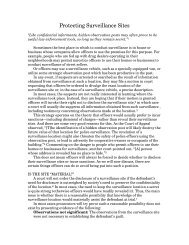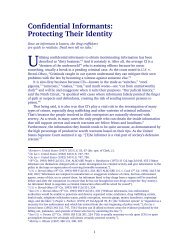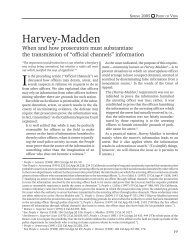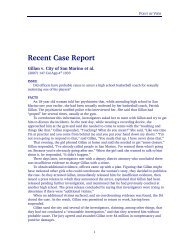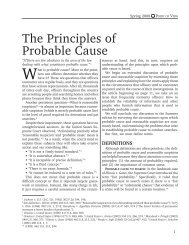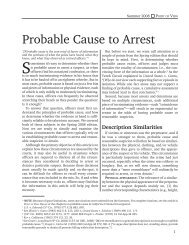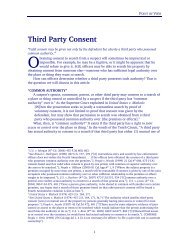Executing Search Warrants - Alameda County District Attorney's Office
Executing Search Warrants - Alameda County District Attorney's Office
Executing Search Warrants - Alameda County District Attorney's Office
Create successful ePaper yourself
Turn your PDF publications into a flip-book with our unique Google optimized e-Paper software.
WHAT MAY BE SEIZED<br />
The “plain view” rule<br />
<strong>Office</strong>rs who are executing a search warrant may, of course, seize any item listed in the<br />
warrant. Under the so-called “plain view” or “nexus” rule, 109 they may also seize unlisted<br />
items if both of the following requirements are met:<br />
(1) LAWFUL SEARCH: The item was discovered while officers were conducting a lawful<br />
search for listed evidence.<br />
(2) PROBABLE CAUSE: When officers seized the item, they had probable cause to<br />
believe it was evidence or would aid in the apprehension of a criminal.<br />
Lawful search<br />
The seizure of unlisted property in plain view is lawful only if officers discovered it<br />
while searching places and things they were expressly or impliedly authorized to search.<br />
For example, if a warrant authorized a search of an apartment for a shotgun and nothing<br />
more, officers would have exceeded the permissible scope of the search if they opened a<br />
cigar box. Consequently, the plain view rule would not apply, and any evidence<br />
discovered in the cigar box would be suppressed. But if the warrant also authorized a<br />
search for drugs, indicia, or some other object that could fit inside a small container, the<br />
search of the cigar box would have been lawful and, consequently, any evidence inside it<br />
would not be suppressed.<br />
PICKING UP UNLISTED PROPERTY: <strong>Office</strong>rs may pick up or move any items in order to<br />
access or view a place or thing in which the listed evidence may be found. They may not,<br />
however, pick up or move an item for a reason unrelated to the execution of the<br />
warrant. 110<br />
PRETEXT SEARCHES: As noted earlier, it sometimes happens that one or more of the<br />
officers conducting the search will be interested in finding evidence that was not listed in<br />
the warrant. This typically occurs when the officers have reason to believe the evidence is<br />
on the premises but they could not list it on the warrant because they lacked probable<br />
cause. Does this make the search unlawful?<br />
No. A search is not unlawful merely because officers hoped or expected to find<br />
unlisted evidence. As the U.S. Supreme Court explained, “The fact that an officer is<br />
interested in an item of evidence and fully expects to find it in the course of a search<br />
should not invalidate its seizure if the search is confined in area and duration by the<br />
terms of the warrant . . . ” 111<br />
109 NOTE: The term “nexus” is outdated. It was coined by the California Supreme Court to express<br />
the requirement that there be a nexus or link between the unlisted evidence and criminal activity.<br />
See People v. Superior Court (Meyers) (1979) 25 Cal.3d 67, 73. In 1987, however, the U.S.<br />
Supreme Court ruled that something more than a link is required: there must be probable cause<br />
to believe the item was contraband or other evidence of a crime. Arizona v. Hicks (1987) 480 US<br />
321, 326.<br />
110 See Arizona v. Hicks (1987) 480 US 321, 325 [“But taking action, unrelated to the objectives of<br />
the authorized intrusion, which exposed to view concealed portions of the apartment or its<br />
contents, did produce a new invasion of respondent’s privacy unjustified by the exigent<br />
circumstances that validated the entry.”]; People v. McGraw (1981) 119 Cal.App.3d 582, 601 [“As<br />
a warrant cannot authorize a general exploratory search by its own terms, neither can officers<br />
make any kind of search they wish merely because a warrant has opened the door.”].<br />
111 Horton v. California (1990) 496 US 128, 138. ALSO SEE People v. Williams (1988) 198<br />
Cal.App.3d 873, 886 [“(T)he fact an officer may have knowledge of possible criminal activity of<br />
the suspect, not necessarily connected with the criminal activity which is the subject of the<br />
warrant, should not necessarily impugn the integrity of his search pursuant to a valid warrant.”];<br />
People v. Gallegos (2002) 96 Cal.App.4 th 612, 625, fn.11; U.S. v. Ewain (9 th Cir. 1996) 88 F.3d<br />
18



